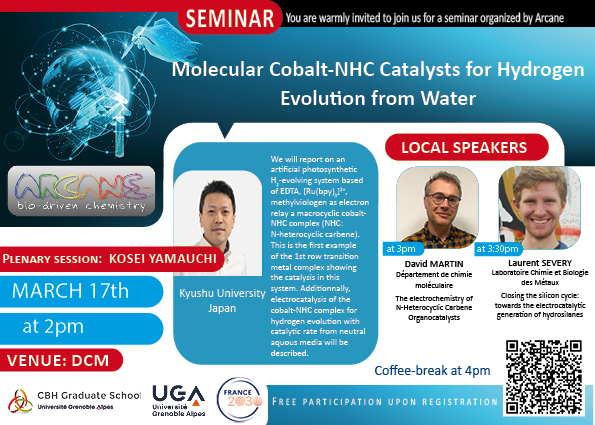- Share
- Share on Facebook
- Share on X
- Share on LinkedIn
Seminar
On March 17, 2025
Saint-Martin-d'Hères - Domaine universitaire

Registration is now open for the Arcane seminar on March 17th at:
https://docs.google.com/forms/d/e/1FAIpQLSfHaICE4FvHjPUqGSjPWcyDDpylY_svYXrtbdBECQvrw_gzCw/viewform?usp=header
Seminar program:
2pm-3pm Kosei Yamauchi - Kyushu University
Molecular Cobalt-NHC Catalysts for Hydrogen Evolution from Wate
Artificial photosynthesis based on splitting water into H2 and O2 with solar energy has attracted recent years. In order to realize the overall water-splitting reaction based on molecular systems, it is crucial to develop highly active molecular catalysts for both hydrogen and oxygen evolution reactions (HER and OER). In this context, we have previously studied on molecular photosystems in which HER is driven by oxidative quenching of [Ru*(bpy)3]2+. The photosystem comprises of EDTA, [Ru(bpy)3]2+, electron relay and the catalyst, where one-electron-reduced species of methylviologen MV2+(i.e., MV+•) only has a driving force (DF) of 150 meV for HER at pH 5.0. Within these studies, we succeeded in demonstrating that a macrocyclic cobalt-NHC complex Co-NHC1 (NHC: N-heterocyclic carbene) serves as a catalyst for HER using MV+• as a reductant. This is the first example of the 1st row transition metal complex showing the catalysis in this system. In addition, experimental and DFT results also reveal that a unique double CPET pathway is taken to evolve H2 by Co-NHC1 with substantially minimized reorganization energies. This pathway can be viewed as related to the so-called Volmer-Heyrovsky mechanism adopted by some metals and is quite unique to Co-NHC1. Meanwhile, we have recently conducted the detailed analyses on the electrocatalysis of Co-NHC1 for hydrogen evolution from water. Importantly, the catalytic rate by Co-NHC1 has turned out to be extremely high even in neutral aqueous media.
The electrochemistry of N-Heterocyclic Carbene Organocatalysts
3:30pm-4pm Laurent Sévery - LCBM
Closing the silicon cycle: towards the electrocatalytic generation of hydrosilanes
4pm Coffee break
Date
from 2pm to 4pm
Localisation
Saint-Martin-d'Hères - Domaine universitaire
Département de Chimie Moléculaire
301, rue de la Chimie
38610 Gières
room 209
- Share
- Share on Facebook
- Share on X
- Share on LinkedIn